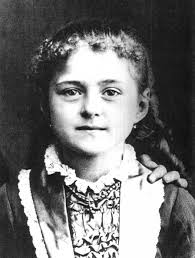 |
| A Guru in Catholic Spirituality |
Someday this earthly body of ours, like that of Jesus, will be transformed into a new kind of spiritual embodiment. At every Funeral Mass we hear: “For those who believe, life is not taken away, life is merely changed.”
In the Gospel according to John, Jesus cleanses the temple of buying and selling, predicts his death and resurrection, and proclaims that a community of disciples will replace the temple in Jerusalem. Jesus is indeed the new temple, in whom divinity and humanity meet, the presence of God among us. The triune God lives within us by virtue of the waters of baptism.
I would like to reflect on a modern icon who recognized that: Therese of Lisieux. We know about her through her remarkable autobiography, “The Story of a Soul.” Therese’s childhood changed to struggles at age 4, when her mother died. At 15, Therese asked to enter the cloister, and she pursued a spiritual pathway that she called the “little way.” She died at 24, holding a crucifix as she said: “My God, I love You.”
What is this “little way” that anyone supposedly can follow? First, Therese realized her own insignificance. Think about it. Seven billion people on this planet; perhaps billions before; perhaps billions after. Trillions of planets in our galaxy; and at least 200 billion galaxies. Wow! Yet God gave us significance. God made us in his image and likeness.
Mental health is an important topic these days. In her youth, Therese noted that she suffered for over a year with a spiritual scrupulosity, in which someone feels unfit for God no matter how much they do. Therese overcame that feeling, realizing God, who is love, created us so that God could be one with us. Therese personified humility: she experienced her own nothingness. Her response was always gratitude to God that she even existed.
Therese recognized that God loved her unconditionally. That's why she had a childlike trust in God, no matter what happened to her in life. and she always welcomed whatever gifts God bestowed upon her.
Finally, Therese loved God unconditionally, even though she often wondered where God was. She believed despite her unbelief. She did small things well out of love for God. She accepted the will of God in daily routine. She willed the good of others, no matter how annoying or mean-spirited she thought they were.
Therese of Lisieux was not simply content with a safe place in heaven. She wanted to spend heaven doing good on earth. Therese's way can be a spiritual guide: gratitude to God; trust in God who loves us; doing things well with love for God.
During Lent I invite all of us to renew ourselves, to revisit the desert of silence, and to rededicate ourselves in regular prayer to God and in compassionate service to one another.
